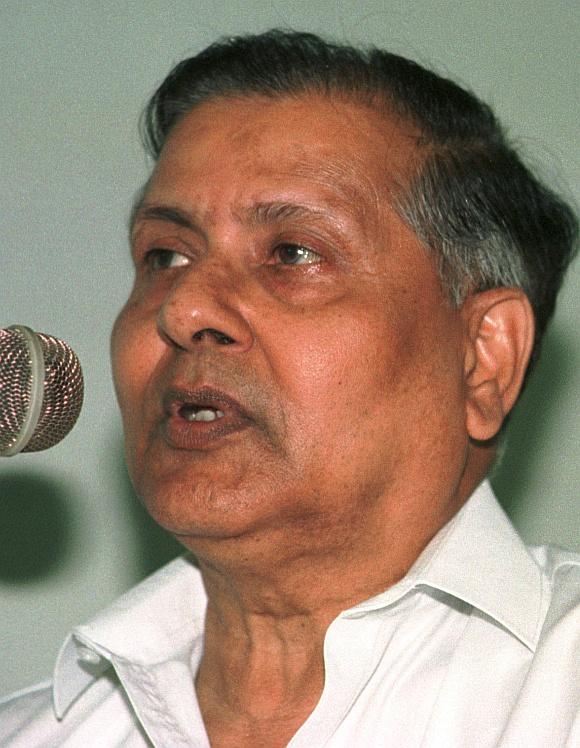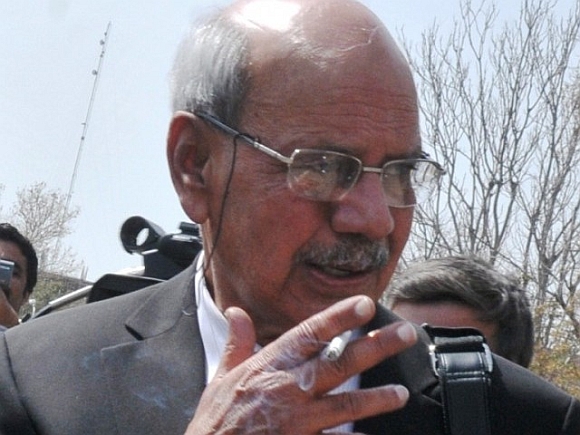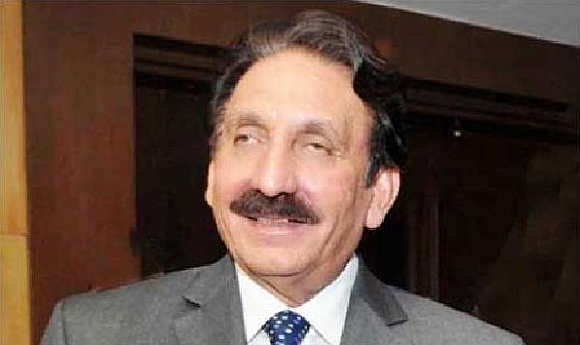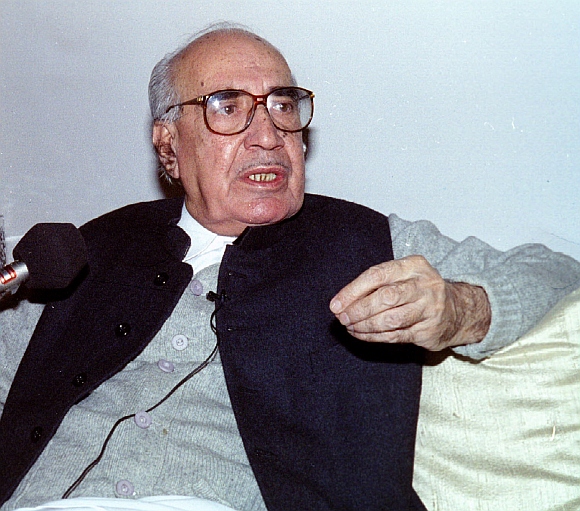
The ongoing war of words between a former Pakistani Chief of Army Staff General Mirza Aslam Beg and a former Inter-Services Intelligence chief Lt Gen Asad Durrani, trading allegations and counter allegations in the supreme court and blaming each other for payment of millions of rupees among anti-Pakistan People's Party politicians to influence the results of the 1990 general elections, has abundantly made it clear how Pakistan's powerful military and intelligence establishment has been manipulating domestic politics for decades now. Amir Mir Reports
The supreme court of Pakistan is actually acting on a petition filed in 1996 by former Air Marshal Asghar Khan, demanding that the court should investigate payments to right-wing politicians made by the ISI.
The money was to be used to ensure that the Pakistan People's Party, which was being led by former Prime Minister Benazir Bhutto at that time, would not win the 1990 general elections.
Although it has been over two decades since the scam took place, the echoes from that episode still ring out, offering a bleak reminder of how the country's mighty security establishment has been blatantly manipulating the will of the people as well as democracy.
The security establishment is under rare scrutiny from the supreme court, which has opened an investigation into allegations that the Pakistan army funneled money to anti-PPP politicians to influence the results of the 1990 general elections which were eventually won by Former Prime Minister Nawaz Sharif-led Islamic Democratic Alliance or Islami Jamhoori Ittehad.
The case has showcased the emerging power of the supreme court, which has recently convicted Prime Minister Yousaf Raza Gilani in a contempt of court case. The main accused in the case -- two former generals -- Beg and Durrani, who have already submitted their affidavits before the supreme court, have admitted that the ISI has been doling out money to certain right wing political parties and leaders.
But they failed to produce any concrete evidence that it was done on the orders of the then President Ghulam Ishaq Khan and his election cell that had ordered the military-led ISI to distribute money amongst anti-PPP politicians and political parties.
...

The admission of the former army chief and the ex-DG ISI that the ISI did distribute money is a clear indictment of the elite intelligence of the country whereas there is no proof in writing to substantiate the generals' claim that President Khan had ordered the same.
Following their failure to shift the blame of money distribution on late President Khan, Beg and Durrani have made contradictory claims in the supreme court, holding each other responsible for the ugly episode.
In his statement recorded before the apex court, Beg made an interesting disclosure: The directorate of ISI is a separate entity which is not under the command of the army chief. Maintaining his innocence, Beg blamed the ISI for distributing money among politicians to rig the 1990 elections.
He insisted that he was not directly involved in maintaining accounts and distributing funds during the 1990 elections. "... In fact, the accounts were maintained by the ISI and (Beg) only instructed then Director General Durrani to maintain accounts and no misappropriation was ever reported or came to his knowledge," Beg said in his statement which was submitted in compliance with the apex court's April 25 order asking him to prove his innocence.
However, while rebutting Beg's affidavit, Durrani has claimed on May 17 that Beg was fully on board in the alleged disbursement of millions of rupees. In his counter affidavit submitted with the Supreme Court, Durrani has submitted that Beg, as army chief, was right from the beginning on board in the operation, involved both in the process of issuing instructions as well as overseeing the disbursements.
"In fact, I received my initial orders to organise distribution of election donations through him," Durrani said, adding that though the subsequent instructions were at times conveyed by Ijlal Haider Zaidi, a member of the President's election team, he kept the army chief fully informed.
The former ISI chief further said that all accounts were maintained by officers belonging to various Military Intelligence detachments, and funds were placed in temporary accounts.
"Only after the disbursements were over, the balance was transferred to a special fund of the ISI; since records were meticulously maintained, all transactions can be accounted for," Durrani asserted.
...

"I believe that as a general of the Pakistan Army, I also have to take responsibility for my action. In this case, I followed orders from Beg, convinced that it was in the country's best interest," Durrani concluded his statement.
The ISI money distribution case is popularly known as Mehran scandal or Mehrangate. Asghar Khan, who recently joined hands with cricketer-turned-politician Imran Khan, had asked the Chief Justice Iftikhar Mohammad Chaudhry to re-open his case and take it to its logical end.
He made Beg, Durrani and Younis Habib of Habib and Mehran Banks as parties in the case. The case had originated on June 16, 1996 from a letter by Asghar Khan to the then Chief Justice Sajjad Ali Shah, asking him to take appropriate action on the then Interior Minister Major General Naseerullah Khan Babar's statement in the National Assembly.
As per details of the case, payments of up to 140 million rupees were allegedly made under the alleged instructions of Beg by the ISI via the owner of Mehran Bank, Yunus Habib.
Intelligence funds were deposited in Mehran bank in 1992 propping up what was an insolvent bank as a favour for its owners help in loaning money to the ISI in 1990 that was used in the creation of the Islami Jamhoori Ittehad and bankrolling the campaigns of many opponents of the PPP.
Chief Justice Syed Sajjad Shah was hearing the case when he was shown the door in November 1997 by his fellow judges following a mutiny, allegedly maneuvered by the then government of Prime Minister Nawaz Sharif.
Babar had stated on the floor of the National Assembly in 1996, "The ISI collected some Rs140 million from the Habib Bank Ltd and distributed among a number of politicians prior to the 1990 elections with a view to manipulate the results in favour of the Islami Jamhoori Ittehad."
Asghar Khan's letter was subsequently converted into a constitutional petition (19 of 1996) by the Chief Justice under Article 184(3), envisaging the human rights jurisdiction of the apex court. According to Khan, the purpose of his petition was to expose the role of ISI in maneuvering the election results and supporting its favourite politicians to fulfill political ends of the establishment.
...

The respondents in the said case were former Beg, Durrani, ex-Director-General of Inter Services Intelligence Directorate, and Mr Younis Habib, ex-chief of ex-Mehran Bank Ltd, then confined in Central Jail, Karachi.
In his written reply submitted with the supreme court (during the tenure of Sajjad Ali Shah) and subsequently reported by the media, Beg had stated, "More serious damage has been caused to the reputation and the good will of the armed forces by Khan in bringing the petition before this honourable court and raising an issue before the apex Court which of course would receive great publicity and would cause greater damage by scandalisation in the media."
Beg added, "That in 1990 the National Assembly of Pakistan was dissolved and the Bhutto government was dismissed. A caretaker government was formed to hold elections within 90 days. The then President, Ghulam Ishaq Khan, had formed an election cell directly under him managed by Roedad Ali Khan/Ijlal Haider Zaidi."
"That later on, the answering respondent was informed by director-general, Inter Services Intelligence that various accounts were opened and the amount of Rs 140 million was deposited in those accounts directly by Habib. The ISI director-general made arrangements to distribute these amounts amongst the politicians belonging to various political parties and persons as instructed by the election cell".
Beg then conceded that it had been a routine for the ISI to support the favourite candidates in elections under directives of the successive chief executives.
"It is in the very knowledge of the answering respondent that it was the practice with the ISI to support the candidates during the elections under the directions of the chief executive of the government."
Afterwards, Durrani, had conceded in an affidavit submitted with the Federal Investigation Agency, that his political cell received Rs140 million from Habib for distribution among anti-PPP politicians at the behest of Beg.
In his written statement submitted with the supreme court last month, Habib, a 90-year-old banker from the state-owned Mehran Bank, has already testified that he doled out the equivalent of $1.5 million in bank funds to politicians and ISI officers on the orders of Beg and President Khan, who was considered close to the country's security establishment.
Keeping in view the available facts which have already been furnished before the supreme court, Beg's attempt to dissociate himself from the ISI defies common sense and brings ridicule to the office of the army chief.
As a matter of fact, Beg had gone public with his disclosure time and again about the money illegally obtained from the now defunct Mehran Bank and given to some of Pakistan's most corrupt politicians to help create the Islami Jamhoori Ittehad to undermine Bhutto's electoral chances.
Besides Durrani, another former ISI chief Lt Gen Hamid Gul had also admitted in the past that at the time of the 1990 general elections, Pakistan's security establishment wanted to create a balance of power in politics by propping up an anti-PPP alliance.
And now the million-dollar question: Will the rebellious supreme court of Pakistan, which has already convicted a sitting Prime Minister (Yousaf Raza Gilani), have the courage to indict the former army and ISI chiefs for having played with the destiny of the nation?
...